Asda Manager Skills: Teamwork, Time Management, Decision Making
VerifiedAdded on 2020/07/22
|12
|3807
|28
Report
AI Summary
This report delves into the crucial skills required for effective management, focusing on teamwork and team development, time management, and decision-making processes within an organizational context, specifically using Asda as a case example. The report examines various team-building approaches, including Management by Objectives and the CREAM learning strategy, alongside the stages of team development (Forming, Storming, Norming, and Performing). It also explores the importance of time management, discussing different time management models such as the four quadrants of time management, and strategies like prioritizing tasks and creating to-do lists to enhance efficiency. Finally, the report highlights the significance of decision-making skills and their connection to effective time management. The report offers insights into how managers can develop these skills to improve their performance and achieve organizational goals.

Developing the Manager
Paraphrase This Document
Need a fresh take? Get an instant paraphrase of this document with our AI Paraphraser
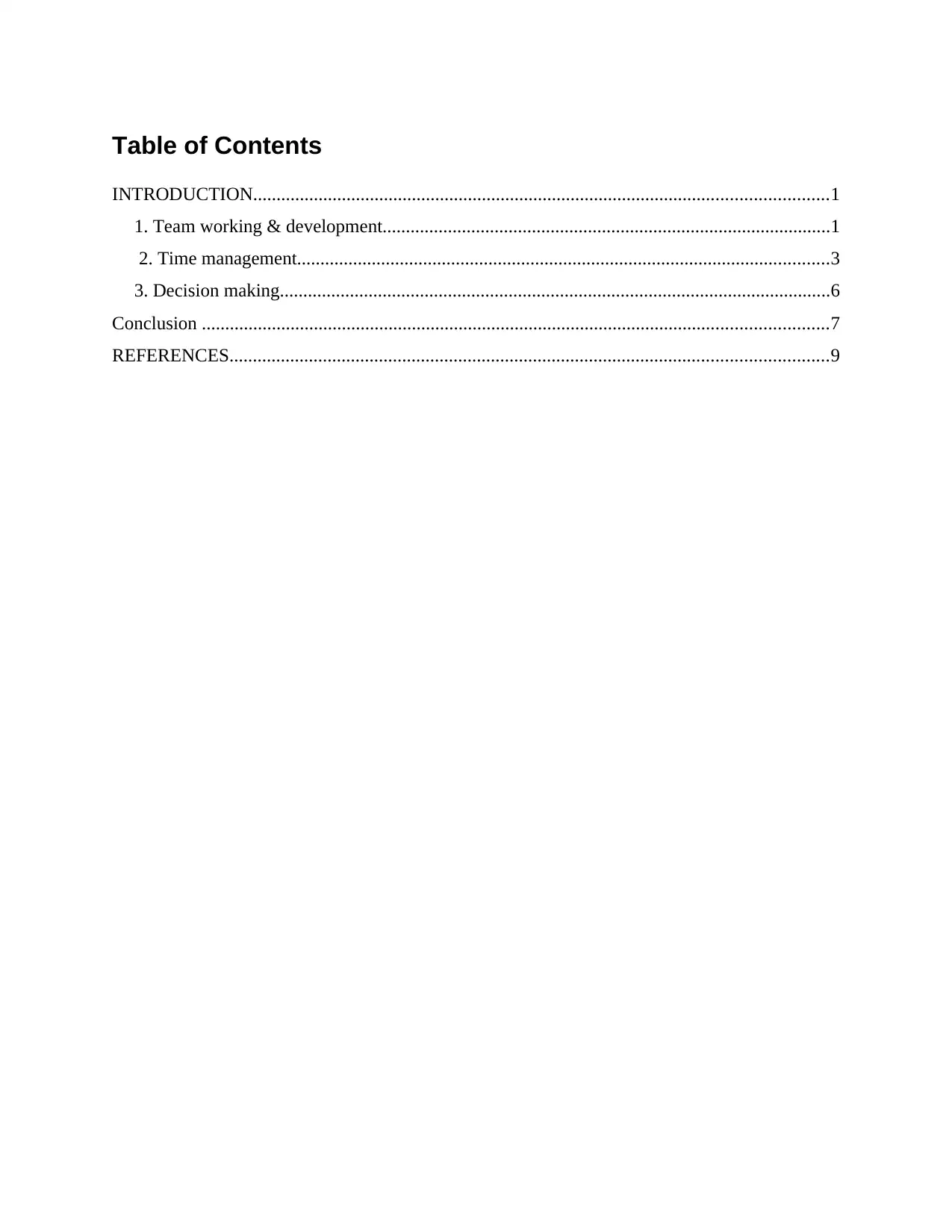
Table of Contents
INTRODUCTION...........................................................................................................................1
1. Team working & development................................................................................................1
2. Time management..................................................................................................................3
3. Decision making......................................................................................................................6
Conclusion ......................................................................................................................................7
REFERENCES................................................................................................................................9
INTRODUCTION...........................................................................................................................1
1. Team working & development................................................................................................1
2. Time management..................................................................................................................3
3. Decision making......................................................................................................................6
Conclusion ......................................................................................................................................7
REFERENCES................................................................................................................................9
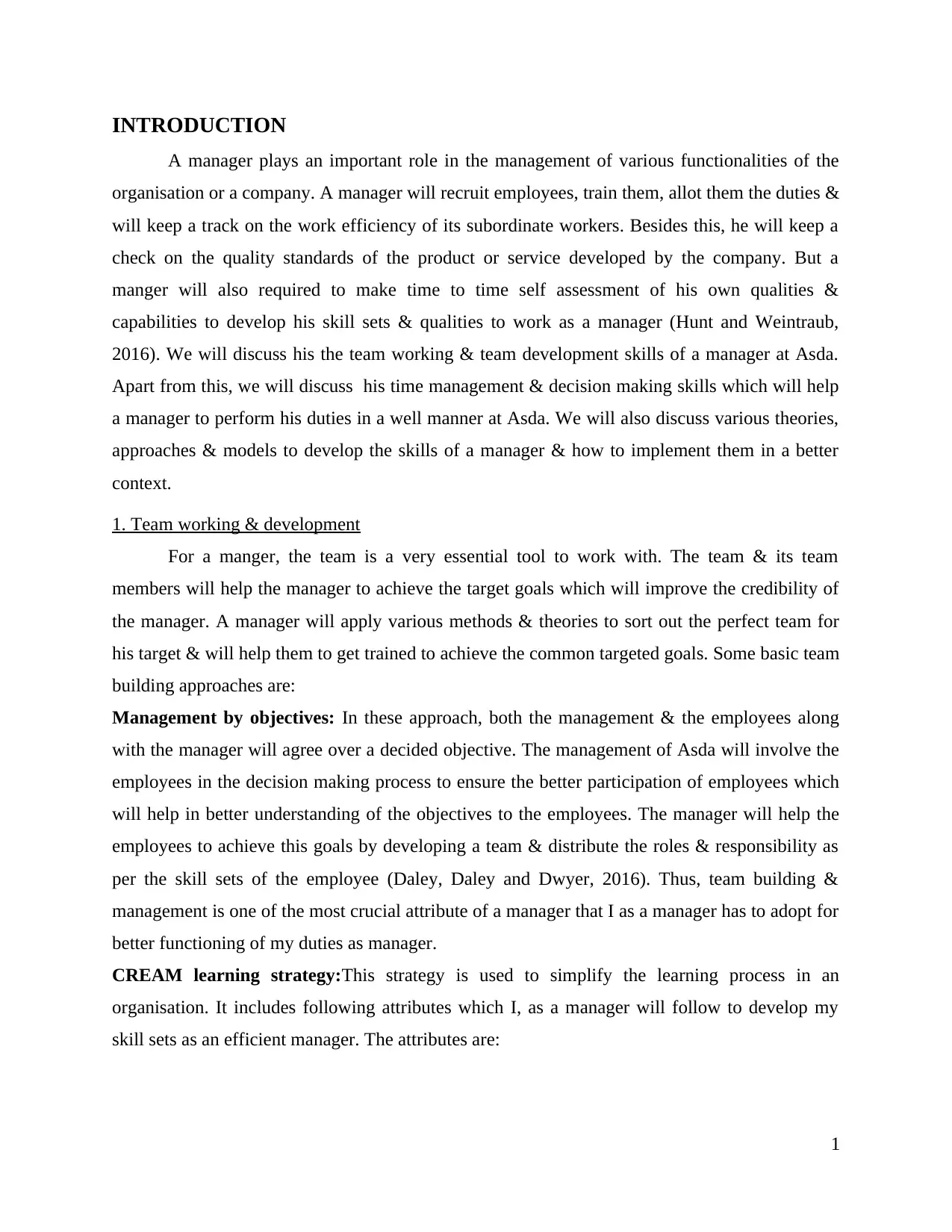
INTRODUCTION
A manager plays an important role in the management of various functionalities of the
organisation or a company. A manager will recruit employees, train them, allot them the duties &
will keep a track on the work efficiency of its subordinate workers. Besides this, he will keep a
check on the quality standards of the product or service developed by the company. But a
manger will also required to make time to time self assessment of his own qualities &
capabilities to develop his skill sets & qualities to work as a manager (Hunt and Weintraub,
2016). We will discuss his the team working & team development skills of a manager at Asda.
Apart from this, we will discuss his time management & decision making skills which will help
a manager to perform his duties in a well manner at Asda. We will also discuss various theories,
approaches & models to develop the skills of a manager & how to implement them in a better
context.
1. Team working & development
For a manger, the team is a very essential tool to work with. The team & its team
members will help the manager to achieve the target goals which will improve the credibility of
the manager. A manager will apply various methods & theories to sort out the perfect team for
his target & will help them to get trained to achieve the common targeted goals. Some basic team
building approaches are:
Management by objectives: In these approach, both the management & the employees along
with the manager will agree over a decided objective. The management of Asda will involve the
employees in the decision making process to ensure the better participation of employees which
will help in better understanding of the objectives to the employees. The manager will help the
employees to achieve this goals by developing a team & distribute the roles & responsibility as
per the skill sets of the employee (Daley, Daley and Dwyer, 2016). Thus, team building &
management is one of the most crucial attribute of a manager that I as a manager has to adopt for
better functioning of my duties as manager.
CREAM learning strategy:This strategy is used to simplify the learning process in an
organisation. It includes following attributes which I, as a manager will follow to develop my
skill sets as an efficient manager. The attributes are:
1
A manager plays an important role in the management of various functionalities of the
organisation or a company. A manager will recruit employees, train them, allot them the duties &
will keep a track on the work efficiency of its subordinate workers. Besides this, he will keep a
check on the quality standards of the product or service developed by the company. But a
manger will also required to make time to time self assessment of his own qualities &
capabilities to develop his skill sets & qualities to work as a manager (Hunt and Weintraub,
2016). We will discuss his the team working & team development skills of a manager at Asda.
Apart from this, we will discuss his time management & decision making skills which will help
a manager to perform his duties in a well manner at Asda. We will also discuss various theories,
approaches & models to develop the skills of a manager & how to implement them in a better
context.
1. Team working & development
For a manger, the team is a very essential tool to work with. The team & its team
members will help the manager to achieve the target goals which will improve the credibility of
the manager. A manager will apply various methods & theories to sort out the perfect team for
his target & will help them to get trained to achieve the common targeted goals. Some basic team
building approaches are:
Management by objectives: In these approach, both the management & the employees along
with the manager will agree over a decided objective. The management of Asda will involve the
employees in the decision making process to ensure the better participation of employees which
will help in better understanding of the objectives to the employees. The manager will help the
employees to achieve this goals by developing a team & distribute the roles & responsibility as
per the skill sets of the employee (Daley, Daley and Dwyer, 2016). Thus, team building &
management is one of the most crucial attribute of a manager that I as a manager has to adopt for
better functioning of my duties as manager.
CREAM learning strategy:This strategy is used to simplify the learning process in an
organisation. It includes following attributes which I, as a manager will follow to develop my
skill sets as an efficient manager. The attributes are:
1
⊘ This is a preview!⊘
Do you want full access?
Subscribe today to unlock all pages.

Trusted by 1+ million students worldwide
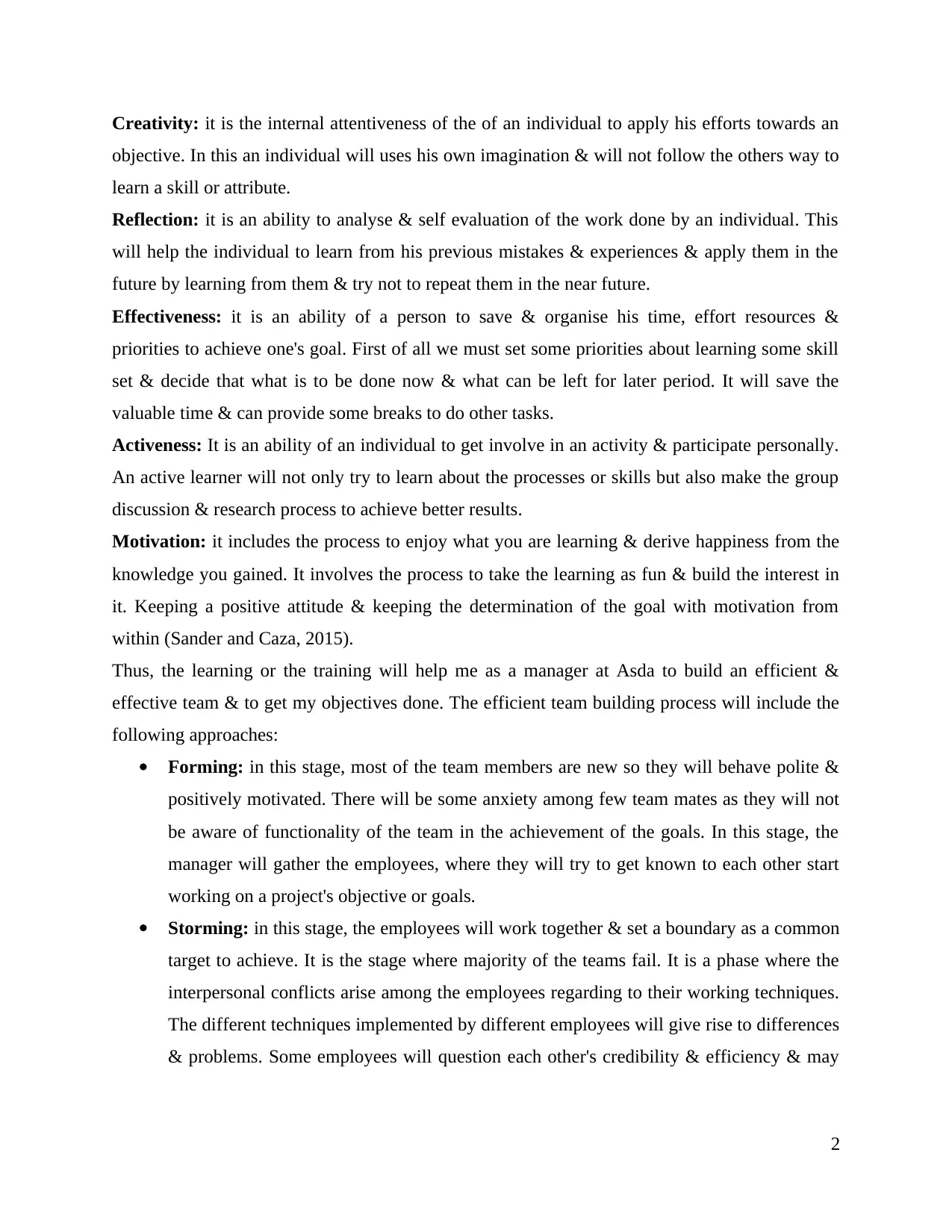
Creativity: it is the internal attentiveness of the of an individual to apply his efforts towards an
objective. In this an individual will uses his own imagination & will not follow the others way to
learn a skill or attribute.
Reflection: it is an ability to analyse & self evaluation of the work done by an individual. This
will help the individual to learn from his previous mistakes & experiences & apply them in the
future by learning from them & try not to repeat them in the near future.
Effectiveness: it is an ability of a person to save & organise his time, effort resources &
priorities to achieve one's goal. First of all we must set some priorities about learning some skill
set & decide that what is to be done now & what can be left for later period. It will save the
valuable time & can provide some breaks to do other tasks.
Activeness: It is an ability of an individual to get involve in an activity & participate personally.
An active learner will not only try to learn about the processes or skills but also make the group
discussion & research process to achieve better results.
Motivation: it includes the process to enjoy what you are learning & derive happiness from the
knowledge you gained. It involves the process to take the learning as fun & build the interest in
it. Keeping a positive attitude & keeping the determination of the goal with motivation from
within (Sander and Caza, 2015).
Thus, the learning or the training will help me as a manager at Asda to build an efficient &
effective team & to get my objectives done. The efficient team building process will include the
following approaches:
Forming: in this stage, most of the team members are new so they will behave polite &
positively motivated. There will be some anxiety among few team mates as they will not
be aware of functionality of the team in the achievement of the goals. In this stage, the
manager will gather the employees, where they will try to get known to each other start
working on a project's objective or goals.
Storming: in this stage, the employees will work together & set a boundary as a common
target to achieve. It is the stage where majority of the teams fail. It is a phase where the
interpersonal conflicts arise among the employees regarding to their working techniques.
The different techniques implemented by different employees will give rise to differences
& problems. Some employees will question each other's credibility & efficiency & may
2
objective. In this an individual will uses his own imagination & will not follow the others way to
learn a skill or attribute.
Reflection: it is an ability to analyse & self evaluation of the work done by an individual. This
will help the individual to learn from his previous mistakes & experiences & apply them in the
future by learning from them & try not to repeat them in the near future.
Effectiveness: it is an ability of a person to save & organise his time, effort resources &
priorities to achieve one's goal. First of all we must set some priorities about learning some skill
set & decide that what is to be done now & what can be left for later period. It will save the
valuable time & can provide some breaks to do other tasks.
Activeness: It is an ability of an individual to get involve in an activity & participate personally.
An active learner will not only try to learn about the processes or skills but also make the group
discussion & research process to achieve better results.
Motivation: it includes the process to enjoy what you are learning & derive happiness from the
knowledge you gained. It involves the process to take the learning as fun & build the interest in
it. Keeping a positive attitude & keeping the determination of the goal with motivation from
within (Sander and Caza, 2015).
Thus, the learning or the training will help me as a manager at Asda to build an efficient &
effective team & to get my objectives done. The efficient team building process will include the
following approaches:
Forming: in this stage, most of the team members are new so they will behave polite &
positively motivated. There will be some anxiety among few team mates as they will not
be aware of functionality of the team in the achievement of the goals. In this stage, the
manager will gather the employees, where they will try to get known to each other start
working on a project's objective or goals.
Storming: in this stage, the employees will work together & set a boundary as a common
target to achieve. It is the stage where majority of the teams fail. It is a phase where the
interpersonal conflicts arise among the employees regarding to their working techniques.
The different techniques implemented by different employees will give rise to differences
& problems. Some employees will question each other's credibility & efficiency & may
2
Paraphrase This Document
Need a fresh take? Get an instant paraphrase of this document with our AI Paraphraser
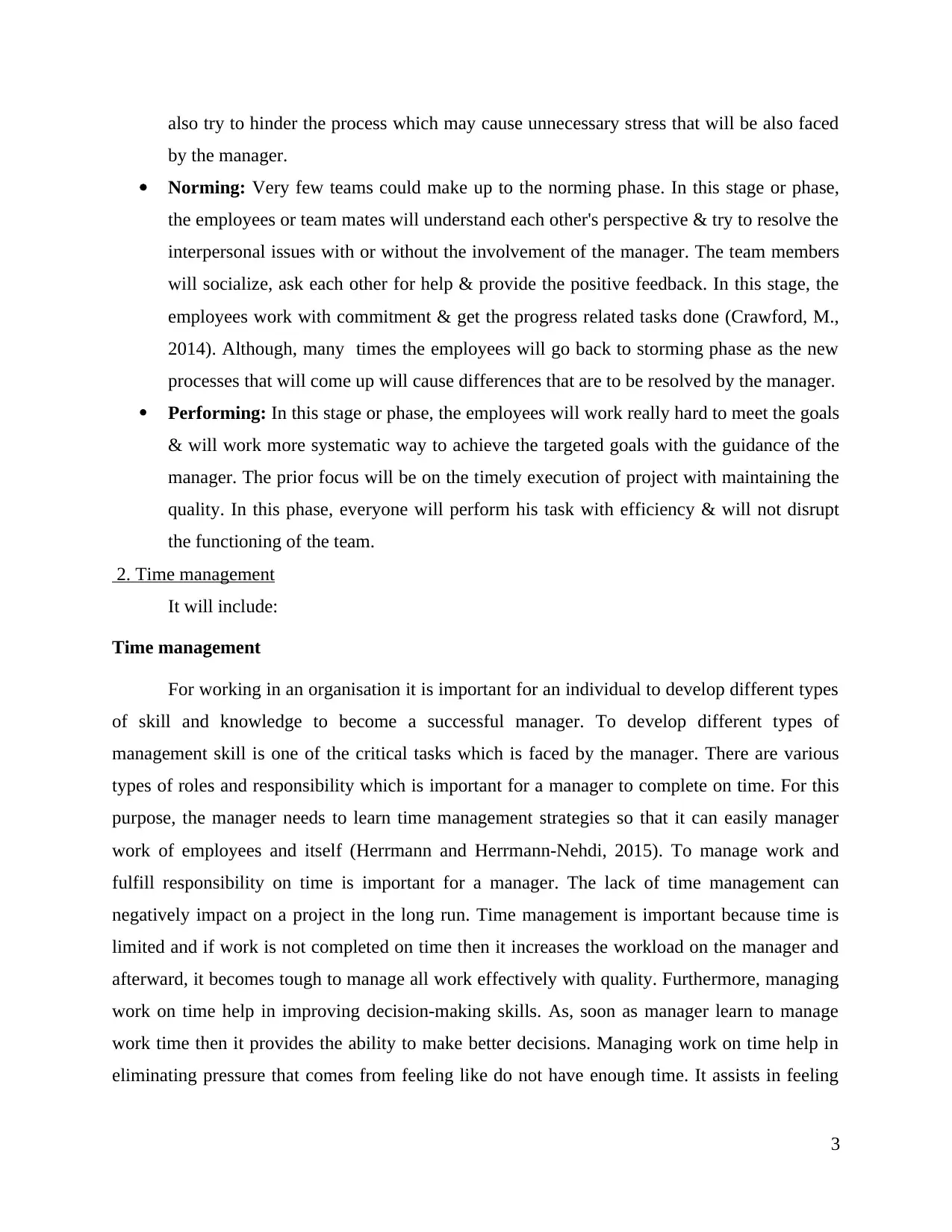
also try to hinder the process which may cause unnecessary stress that will be also faced
by the manager.
Norming: Very few teams could make up to the norming phase. In this stage or phase,
the employees or team mates will understand each other's perspective & try to resolve the
interpersonal issues with or without the involvement of the manager. The team members
will socialize, ask each other for help & provide the positive feedback. In this stage, the
employees work with commitment & get the progress related tasks done (Crawford, M.,
2014). Although, many times the employees will go back to storming phase as the new
processes that will come up will cause differences that are to be resolved by the manager.
Performing: In this stage or phase, the employees will work really hard to meet the goals
& will work more systematic way to achieve the targeted goals with the guidance of the
manager. The prior focus will be on the timely execution of project with maintaining the
quality. In this phase, everyone will perform his task with efficiency & will not disrupt
the functioning of the team.
2. Time management
It will include:
Time management
For working in an organisation it is important for an individual to develop different types
of skill and knowledge to become a successful manager. To develop different types of
management skill is one of the critical tasks which is faced by the manager. There are various
types of roles and responsibility which is important for a manager to complete on time. For this
purpose, the manager needs to learn time management strategies so that it can easily manager
work of employees and itself (Herrmann and Herrmann-Nehdi, 2015). To manage work and
fulfill responsibility on time is important for a manager. The lack of time management can
negatively impact on a project in the long run. Time management is important because time is
limited and if work is not completed on time then it increases the workload on the manager and
afterward, it becomes tough to manage all work effectively with quality. Furthermore, managing
work on time help in improving decision-making skills. As, soon as manager learn to manage
work time then it provides the ability to make better decisions. Managing work on time help in
eliminating pressure that comes from feeling like do not have enough time. It assists in feeling
3
by the manager.
Norming: Very few teams could make up to the norming phase. In this stage or phase,
the employees or team mates will understand each other's perspective & try to resolve the
interpersonal issues with or without the involvement of the manager. The team members
will socialize, ask each other for help & provide the positive feedback. In this stage, the
employees work with commitment & get the progress related tasks done (Crawford, M.,
2014). Although, many times the employees will go back to storming phase as the new
processes that will come up will cause differences that are to be resolved by the manager.
Performing: In this stage or phase, the employees will work really hard to meet the goals
& will work more systematic way to achieve the targeted goals with the guidance of the
manager. The prior focus will be on the timely execution of project with maintaining the
quality. In this phase, everyone will perform his task with efficiency & will not disrupt
the functioning of the team.
2. Time management
It will include:
Time management
For working in an organisation it is important for an individual to develop different types
of skill and knowledge to become a successful manager. To develop different types of
management skill is one of the critical tasks which is faced by the manager. There are various
types of roles and responsibility which is important for a manager to complete on time. For this
purpose, the manager needs to learn time management strategies so that it can easily manager
work of employees and itself (Herrmann and Herrmann-Nehdi, 2015). To manage work and
fulfill responsibility on time is important for a manager. The lack of time management can
negatively impact on a project in the long run. Time management is important because time is
limited and if work is not completed on time then it increases the workload on the manager and
afterward, it becomes tough to manage all work effectively with quality. Furthermore, managing
work on time help in improving decision-making skills. As, soon as manager learn to manage
work time then it provides the ability to make better decisions. Managing work on time help in
eliminating pressure that comes from feeling like do not have enough time. It assists in feeling
3
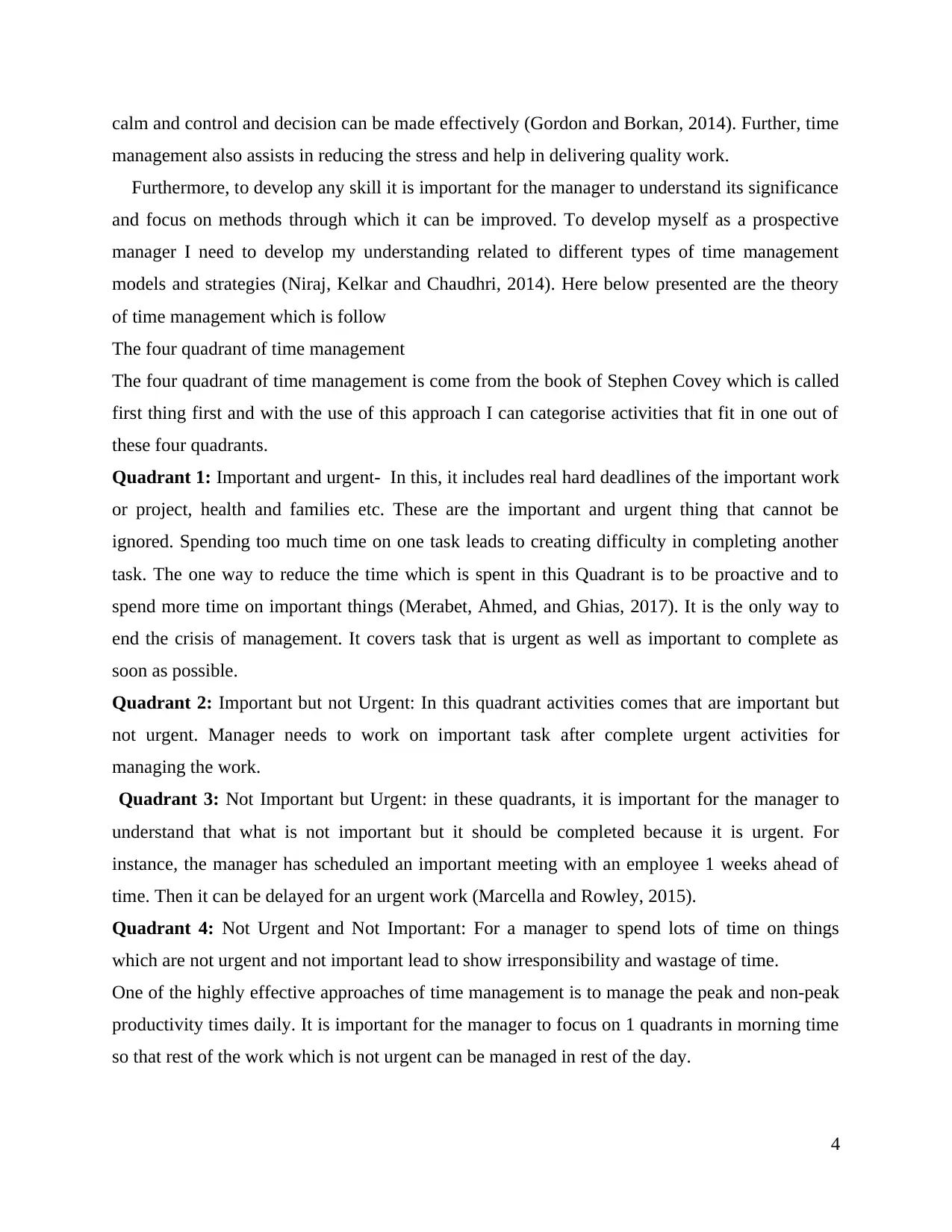
calm and control and decision can be made effectively (Gordon and Borkan, 2014). Further, time
management also assists in reducing the stress and help in delivering quality work.
Furthermore, to develop any skill it is important for the manager to understand its significance
and focus on methods through which it can be improved. To develop myself as a prospective
manager I need to develop my understanding related to different types of time management
models and strategies (Niraj, Kelkar and Chaudhri, 2014). Here below presented are the theory
of time management which is follow
The four quadrant of time management
The four quadrant of time management is come from the book of Stephen Covey which is called
first thing first and with the use of this approach I can categorise activities that fit in one out of
these four quadrants.
Quadrant 1: Important and urgent- In this, it includes real hard deadlines of the important work
or project, health and families etc. These are the important and urgent thing that cannot be
ignored. Spending too much time on one task leads to creating difficulty in completing another
task. The one way to reduce the time which is spent in this Quadrant is to be proactive and to
spend more time on important things (Merabet, Ahmed, and Ghias, 2017). It is the only way to
end the crisis of management. It covers task that is urgent as well as important to complete as
soon as possible.
Quadrant 2: Important but not Urgent: In this quadrant activities comes that are important but
not urgent. Manager needs to work on important task after complete urgent activities for
managing the work.
Quadrant 3: Not Important but Urgent: in these quadrants, it is important for the manager to
understand that what is not important but it should be completed because it is urgent. For
instance, the manager has scheduled an important meeting with an employee 1 weeks ahead of
time. Then it can be delayed for an urgent work (Marcella and Rowley, 2015).
Quadrant 4: Not Urgent and Not Important: For a manager to spend lots of time on things
which are not urgent and not important lead to show irresponsibility and wastage of time.
One of the highly effective approaches of time management is to manage the peak and non-peak
productivity times daily. It is important for the manager to focus on 1 quadrants in morning time
so that rest of the work which is not urgent can be managed in rest of the day.
4
management also assists in reducing the stress and help in delivering quality work.
Furthermore, to develop any skill it is important for the manager to understand its significance
and focus on methods through which it can be improved. To develop myself as a prospective
manager I need to develop my understanding related to different types of time management
models and strategies (Niraj, Kelkar and Chaudhri, 2014). Here below presented are the theory
of time management which is follow
The four quadrant of time management
The four quadrant of time management is come from the book of Stephen Covey which is called
first thing first and with the use of this approach I can categorise activities that fit in one out of
these four quadrants.
Quadrant 1: Important and urgent- In this, it includes real hard deadlines of the important work
or project, health and families etc. These are the important and urgent thing that cannot be
ignored. Spending too much time on one task leads to creating difficulty in completing another
task. The one way to reduce the time which is spent in this Quadrant is to be proactive and to
spend more time on important things (Merabet, Ahmed, and Ghias, 2017). It is the only way to
end the crisis of management. It covers task that is urgent as well as important to complete as
soon as possible.
Quadrant 2: Important but not Urgent: In this quadrant activities comes that are important but
not urgent. Manager needs to work on important task after complete urgent activities for
managing the work.
Quadrant 3: Not Important but Urgent: in these quadrants, it is important for the manager to
understand that what is not important but it should be completed because it is urgent. For
instance, the manager has scheduled an important meeting with an employee 1 weeks ahead of
time. Then it can be delayed for an urgent work (Marcella and Rowley, 2015).
Quadrant 4: Not Urgent and Not Important: For a manager to spend lots of time on things
which are not urgent and not important lead to show irresponsibility and wastage of time.
One of the highly effective approaches of time management is to manage the peak and non-peak
productivity times daily. It is important for the manager to focus on 1 quadrants in morning time
so that rest of the work which is not urgent can be managed in rest of the day.
4
⊘ This is a preview!⊘
Do you want full access?
Subscribe today to unlock all pages.

Trusted by 1+ million students worldwide
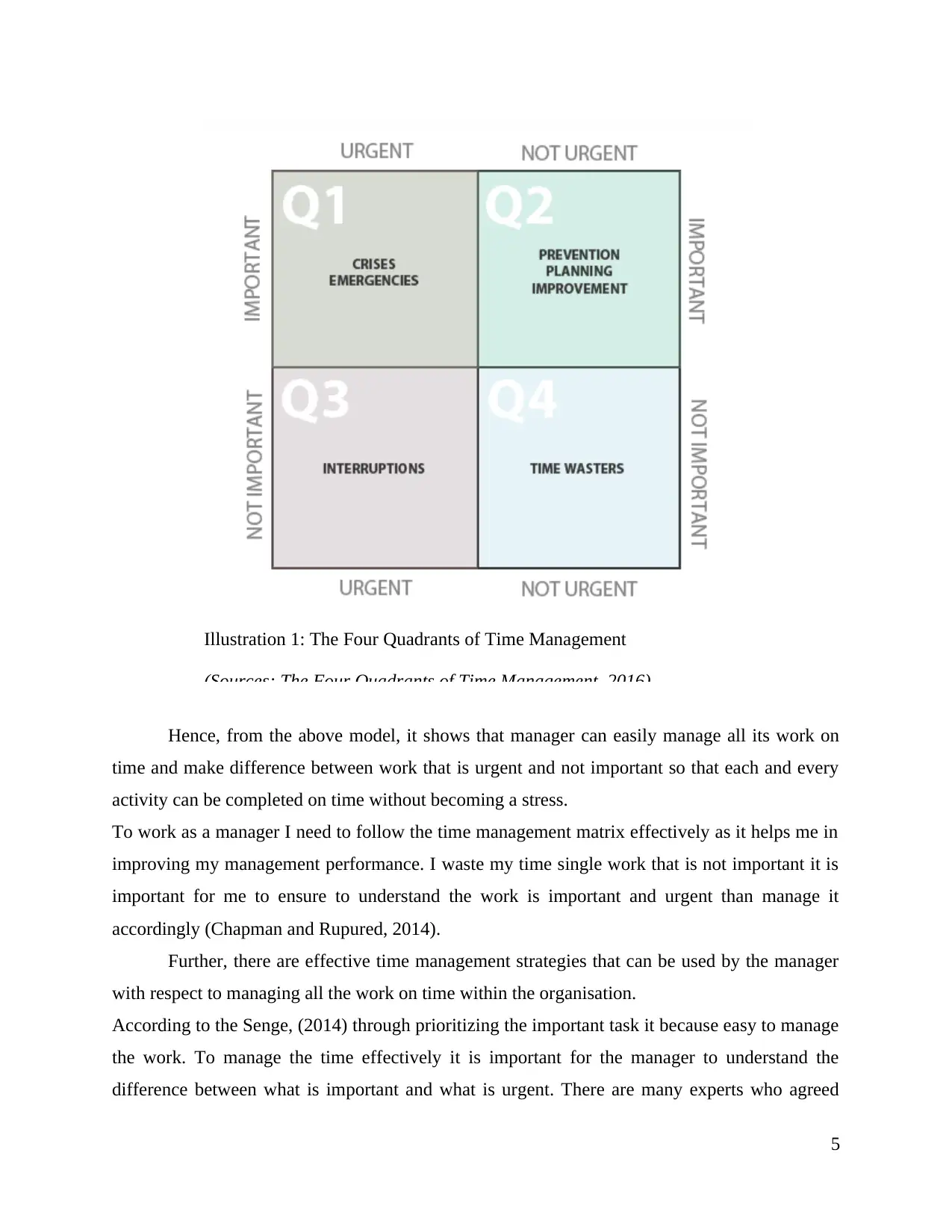
Hence, from the above model, it shows that manager can easily manage all its work on
time and make difference between work that is urgent and not important so that each and every
activity can be completed on time without becoming a stress.
To work as a manager I need to follow the time management matrix effectively as it helps me in
improving my management performance. I waste my time single work that is not important it is
important for me to ensure to understand the work is important and urgent than manage it
accordingly (Chapman and Rupured, 2014).
Further, there are effective time management strategies that can be used by the manager
with respect to managing all the work on time within the organisation.
According to the Senge, (2014) through prioritizing the important task it because easy to manage
the work. To manage the time effectively it is important for the manager to understand the
difference between what is important and what is urgent. There are many experts who agreed
5
Illustration 1: The Four Quadrants of Time Management
(Sources: The Four Quadrants of Time Management, 2016)
time and make difference between work that is urgent and not important so that each and every
activity can be completed on time without becoming a stress.
To work as a manager I need to follow the time management matrix effectively as it helps me in
improving my management performance. I waste my time single work that is not important it is
important for me to ensure to understand the work is important and urgent than manage it
accordingly (Chapman and Rupured, 2014).
Further, there are effective time management strategies that can be used by the manager
with respect to managing all the work on time within the organisation.
According to the Senge, (2014) through prioritizing the important task it because easy to manage
the work. To manage the time effectively it is important for the manager to understand the
difference between what is important and what is urgent. There are many experts who agreed
5
Illustration 1: The Four Quadrants of Time Management
(Sources: The Four Quadrants of Time Management, 2016)
Paraphrase This Document
Need a fresh take? Get an instant paraphrase of this document with our AI Paraphraser
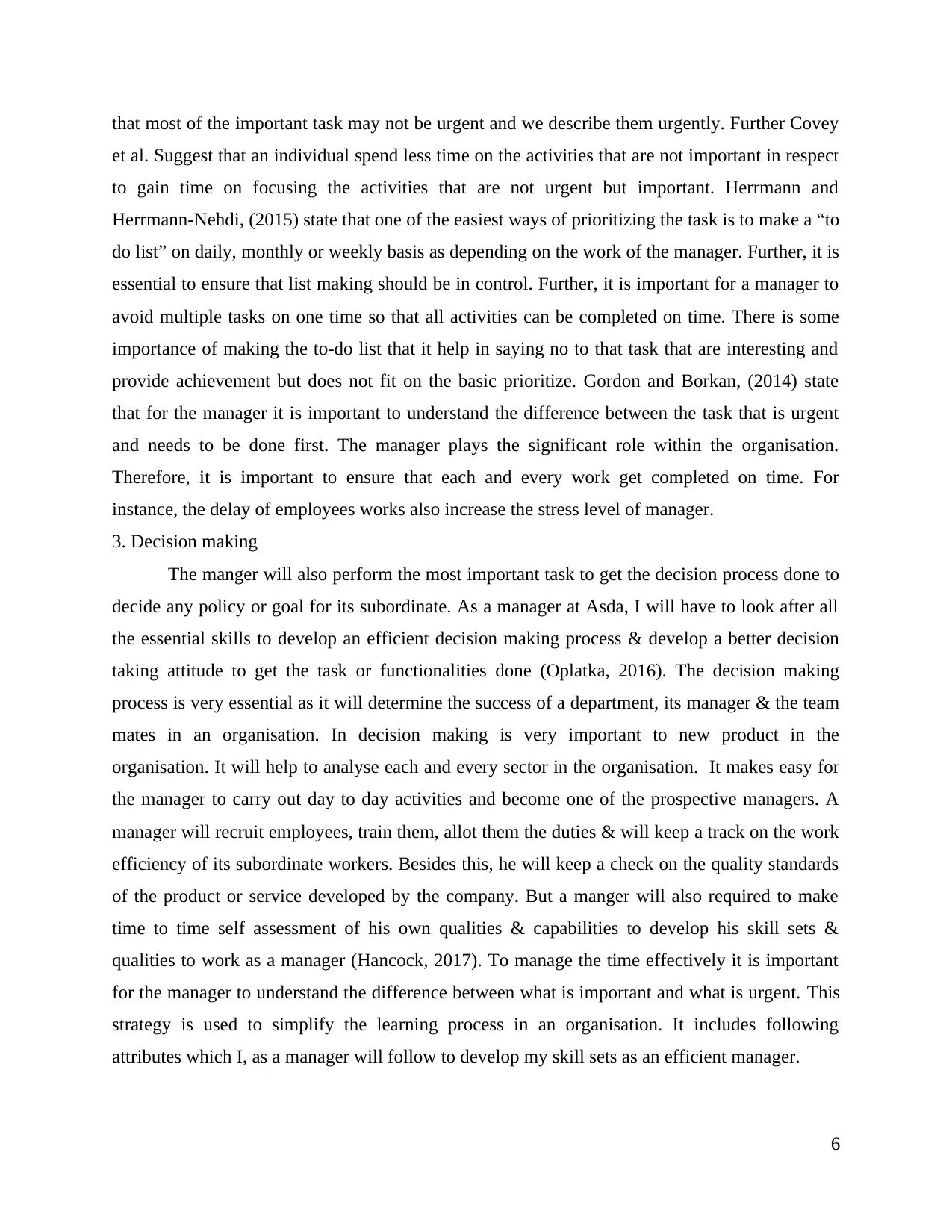
that most of the important task may not be urgent and we describe them urgently. Further Covey
et al. Suggest that an individual spend less time on the activities that are not important in respect
to gain time on focusing the activities that are not urgent but important. Herrmann and
Herrmann-Nehdi, (2015) state that one of the easiest ways of prioritizing the task is to make a “to
do list” on daily, monthly or weekly basis as depending on the work of the manager. Further, it is
essential to ensure that list making should be in control. Further, it is important for a manager to
avoid multiple tasks on one time so that all activities can be completed on time. There is some
importance of making the to-do list that it help in saying no to that task that are interesting and
provide achievement but does not fit on the basic prioritize. Gordon and Borkan, (2014) state
that for the manager it is important to understand the difference between the task that is urgent
and needs to be done first. The manager plays the significant role within the organisation.
Therefore, it is important to ensure that each and every work get completed on time. For
instance, the delay of employees works also increase the stress level of manager.
3. Decision making
The manger will also perform the most important task to get the decision process done to
decide any policy or goal for its subordinate. As a manager at Asda, I will have to look after all
the essential skills to develop an efficient decision making process & develop a better decision
taking attitude to get the task or functionalities done (Oplatka, 2016). The decision making
process is very essential as it will determine the success of a department, its manager & the team
mates in an organisation. In decision making is very important to new product in the
organisation. It will help to analyse each and every sector in the organisation. It makes easy for
the manager to carry out day to day activities and become one of the prospective managers. A
manager will recruit employees, train them, allot them the duties & will keep a track on the work
efficiency of its subordinate workers. Besides this, he will keep a check on the quality standards
of the product or service developed by the company. But a manger will also required to make
time to time self assessment of his own qualities & capabilities to develop his skill sets &
qualities to work as a manager (Hancock, 2017). To manage the time effectively it is important
for the manager to understand the difference between what is important and what is urgent. This
strategy is used to simplify the learning process in an organisation. It includes following
attributes which I, as a manager will follow to develop my skill sets as an efficient manager.
6
et al. Suggest that an individual spend less time on the activities that are not important in respect
to gain time on focusing the activities that are not urgent but important. Herrmann and
Herrmann-Nehdi, (2015) state that one of the easiest ways of prioritizing the task is to make a “to
do list” on daily, monthly or weekly basis as depending on the work of the manager. Further, it is
essential to ensure that list making should be in control. Further, it is important for a manager to
avoid multiple tasks on one time so that all activities can be completed on time. There is some
importance of making the to-do list that it help in saying no to that task that are interesting and
provide achievement but does not fit on the basic prioritize. Gordon and Borkan, (2014) state
that for the manager it is important to understand the difference between the task that is urgent
and needs to be done first. The manager plays the significant role within the organisation.
Therefore, it is important to ensure that each and every work get completed on time. For
instance, the delay of employees works also increase the stress level of manager.
3. Decision making
The manger will also perform the most important task to get the decision process done to
decide any policy or goal for its subordinate. As a manager at Asda, I will have to look after all
the essential skills to develop an efficient decision making process & develop a better decision
taking attitude to get the task or functionalities done (Oplatka, 2016). The decision making
process is very essential as it will determine the success of a department, its manager & the team
mates in an organisation. In decision making is very important to new product in the
organisation. It will help to analyse each and every sector in the organisation. It makes easy for
the manager to carry out day to day activities and become one of the prospective managers. A
manager will recruit employees, train them, allot them the duties & will keep a track on the work
efficiency of its subordinate workers. Besides this, he will keep a check on the quality standards
of the product or service developed by the company. But a manger will also required to make
time to time self assessment of his own qualities & capabilities to develop his skill sets &
qualities to work as a manager (Hancock, 2017). To manage the time effectively it is important
for the manager to understand the difference between what is important and what is urgent. This
strategy is used to simplify the learning process in an organisation. It includes following
attributes which I, as a manager will follow to develop my skill sets as an efficient manager.
6
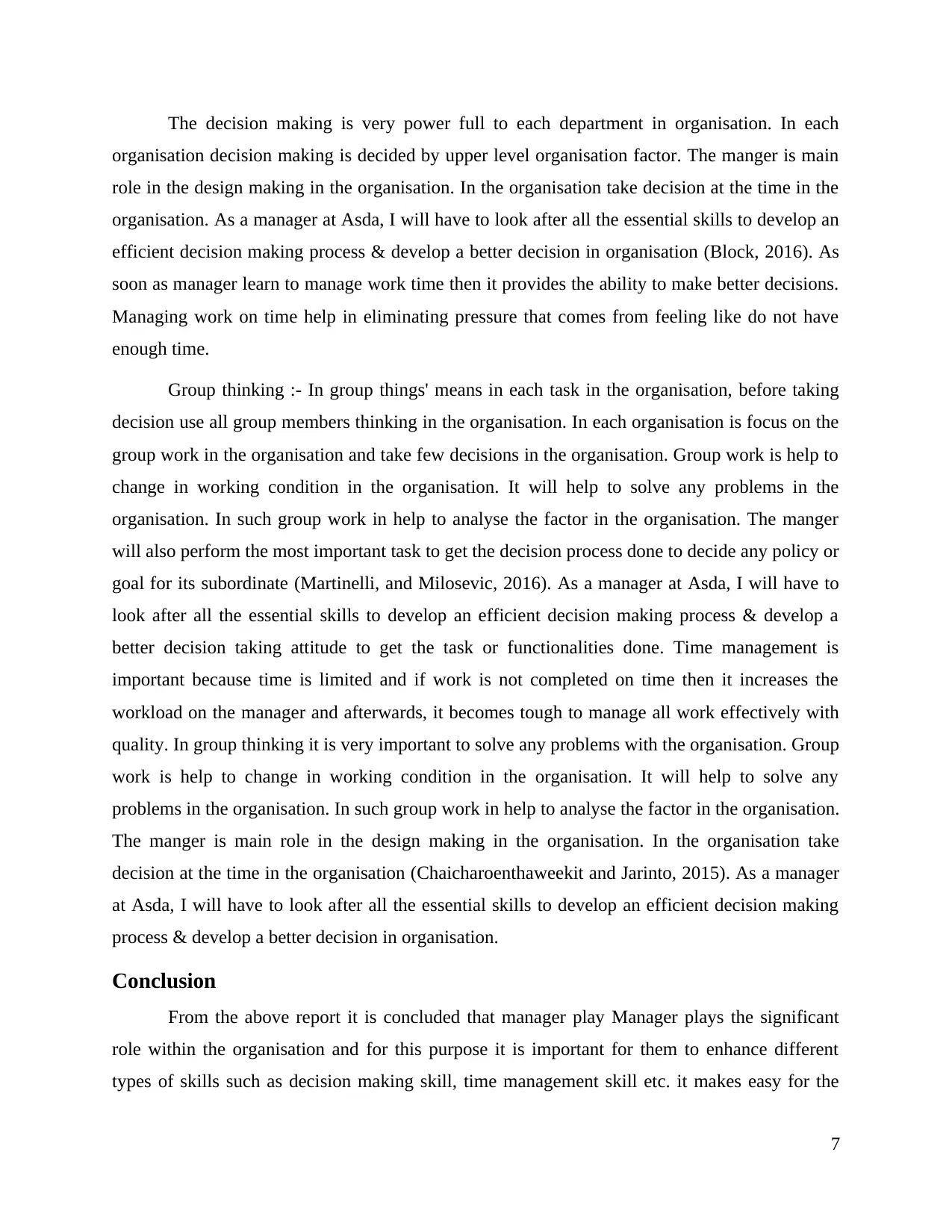
The decision making is very power full to each department in organisation. In each
organisation decision making is decided by upper level organisation factor. The manger is main
role in the design making in the organisation. In the organisation take decision at the time in the
organisation. As a manager at Asda, I will have to look after all the essential skills to develop an
efficient decision making process & develop a better decision in organisation (Block, 2016). As
soon as manager learn to manage work time then it provides the ability to make better decisions.
Managing work on time help in eliminating pressure that comes from feeling like do not have
enough time.
Group thinking :- In group things' means in each task in the organisation, before taking
decision use all group members thinking in the organisation. In each organisation is focus on the
group work in the organisation and take few decisions in the organisation. Group work is help to
change in working condition in the organisation. It will help to solve any problems in the
organisation. In such group work in help to analyse the factor in the organisation. The manger
will also perform the most important task to get the decision process done to decide any policy or
goal for its subordinate (Martinelli, and Milosevic, 2016). As a manager at Asda, I will have to
look after all the essential skills to develop an efficient decision making process & develop a
better decision taking attitude to get the task or functionalities done. Time management is
important because time is limited and if work is not completed on time then it increases the
workload on the manager and afterwards, it becomes tough to manage all work effectively with
quality. In group thinking it is very important to solve any problems with the organisation. Group
work is help to change in working condition in the organisation. It will help to solve any
problems in the organisation. In such group work in help to analyse the factor in the organisation.
The manger is main role in the design making in the organisation. In the organisation take
decision at the time in the organisation (Chaicharoenthaweekit and Jarinto, 2015). As a manager
at Asda, I will have to look after all the essential skills to develop an efficient decision making
process & develop a better decision in organisation.
Conclusion
From the above report it is concluded that manager play Manager plays the significant
role within the organisation and for this purpose it is important for them to enhance different
types of skills such as decision making skill, time management skill etc. it makes easy for the
7
organisation decision making is decided by upper level organisation factor. The manger is main
role in the design making in the organisation. In the organisation take decision at the time in the
organisation. As a manager at Asda, I will have to look after all the essential skills to develop an
efficient decision making process & develop a better decision in organisation (Block, 2016). As
soon as manager learn to manage work time then it provides the ability to make better decisions.
Managing work on time help in eliminating pressure that comes from feeling like do not have
enough time.
Group thinking :- In group things' means in each task in the organisation, before taking
decision use all group members thinking in the organisation. In each organisation is focus on the
group work in the organisation and take few decisions in the organisation. Group work is help to
change in working condition in the organisation. It will help to solve any problems in the
organisation. In such group work in help to analyse the factor in the organisation. The manger
will also perform the most important task to get the decision process done to decide any policy or
goal for its subordinate (Martinelli, and Milosevic, 2016). As a manager at Asda, I will have to
look after all the essential skills to develop an efficient decision making process & develop a
better decision taking attitude to get the task or functionalities done. Time management is
important because time is limited and if work is not completed on time then it increases the
workload on the manager and afterwards, it becomes tough to manage all work effectively with
quality. In group thinking it is very important to solve any problems with the organisation. Group
work is help to change in working condition in the organisation. It will help to solve any
problems in the organisation. In such group work in help to analyse the factor in the organisation.
The manger is main role in the design making in the organisation. In the organisation take
decision at the time in the organisation (Chaicharoenthaweekit and Jarinto, 2015). As a manager
at Asda, I will have to look after all the essential skills to develop an efficient decision making
process & develop a better decision in organisation.
Conclusion
From the above report it is concluded that manager play Manager plays the significant
role within the organisation and for this purpose it is important for them to enhance different
types of skills such as decision making skill, time management skill etc. it makes easy for the
7
⊘ This is a preview!⊘
Do you want full access?
Subscribe today to unlock all pages.

Trusted by 1+ million students worldwide
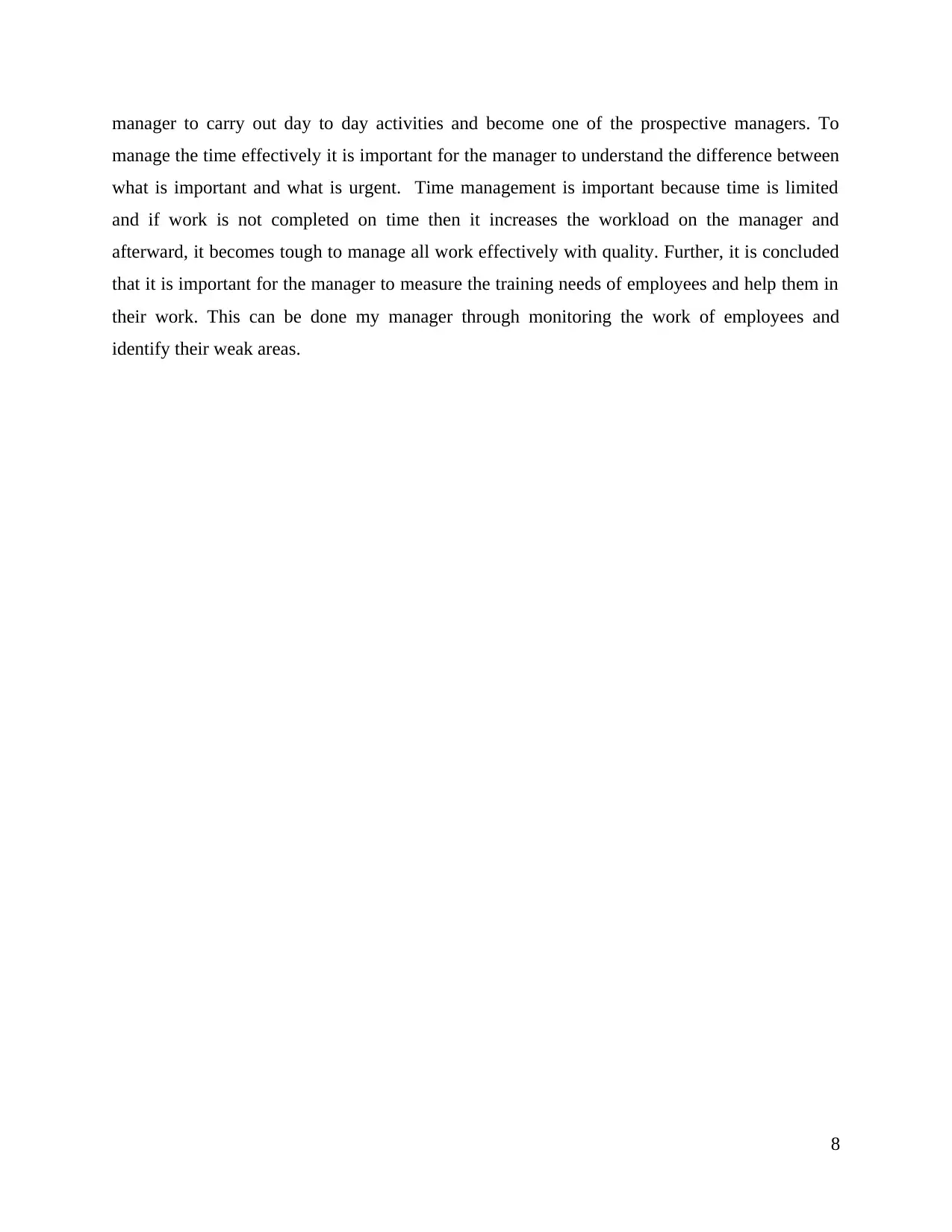
manager to carry out day to day activities and become one of the prospective managers. To
manage the time effectively it is important for the manager to understand the difference between
what is important and what is urgent. Time management is important because time is limited
and if work is not completed on time then it increases the workload on the manager and
afterward, it becomes tough to manage all work effectively with quality. Further, it is concluded
that it is important for the manager to measure the training needs of employees and help them in
their work. This can be done my manager through monitoring the work of employees and
identify their weak areas.
8
manage the time effectively it is important for the manager to understand the difference between
what is important and what is urgent. Time management is important because time is limited
and if work is not completed on time then it increases the workload on the manager and
afterward, it becomes tough to manage all work effectively with quality. Further, it is concluded
that it is important for the manager to measure the training needs of employees and help them in
their work. This can be done my manager through monitoring the work of employees and
identify their weak areas.
8
Paraphrase This Document
Need a fresh take? Get an instant paraphrase of this document with our AI Paraphraser
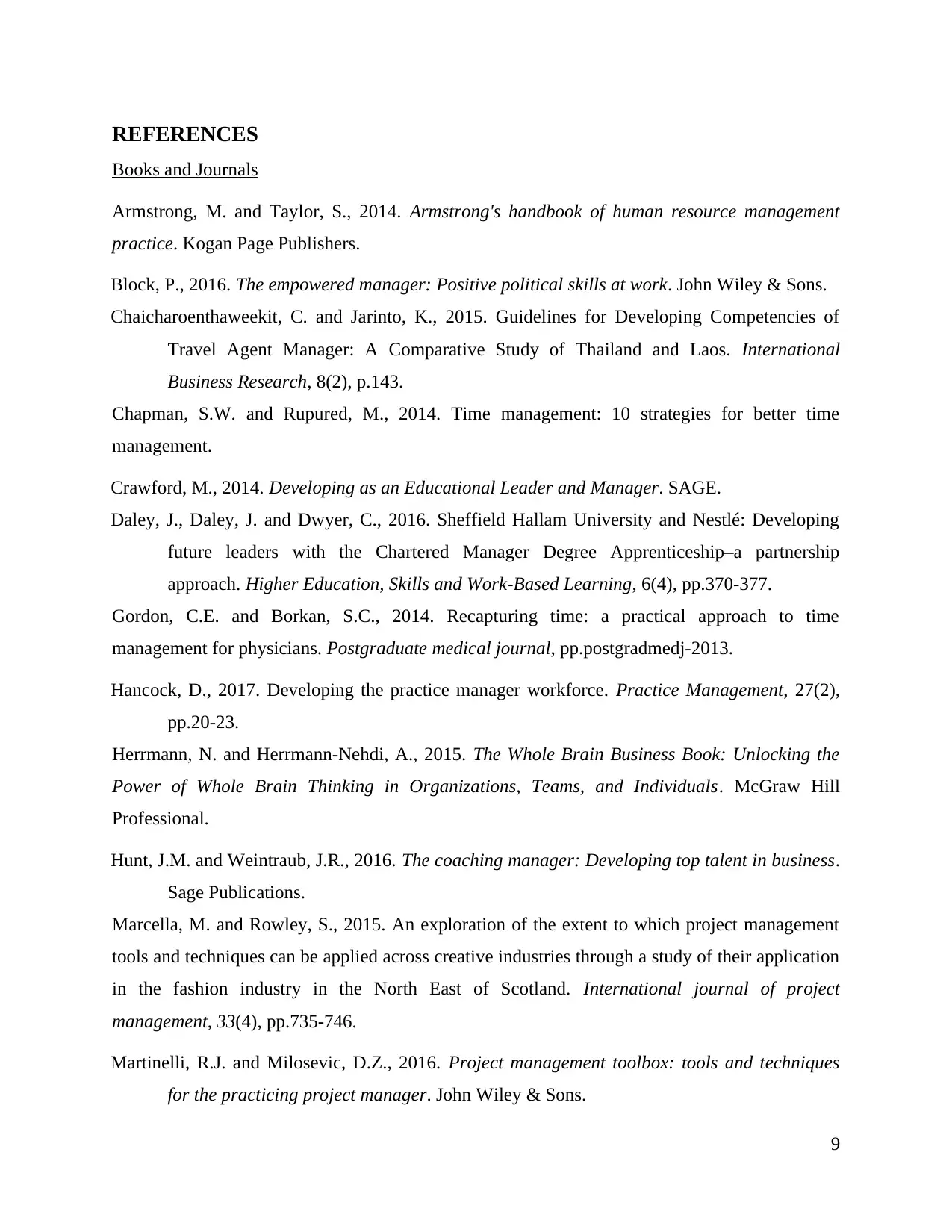
REFERENCES
Books and Journals
Armstrong, M. and Taylor, S., 2014. Armstrong's handbook of human resource management
practice. Kogan Page Publishers.
Block, P., 2016. The empowered manager: Positive political skills at work. John Wiley & Sons.
Chaicharoenthaweekit, C. and Jarinto, K., 2015. Guidelines for Developing Competencies of
Travel Agent Manager: A Comparative Study of Thailand and Laos. International
Business Research, 8(2), p.143.
Chapman, S.W. and Rupured, M., 2014. Time management: 10 strategies for better time
management.
Crawford, M., 2014. Developing as an Educational Leader and Manager. SAGE.
Daley, J., Daley, J. and Dwyer, C., 2016. Sheffield Hallam University and Nestlé: Developing
future leaders with the Chartered Manager Degree Apprenticeship–a partnership
approach. Higher Education, Skills and Work-Based Learning, 6(4), pp.370-377.
Gordon, C.E. and Borkan, S.C., 2014. Recapturing time: a practical approach to time
management for physicians. Postgraduate medical journal, pp.postgradmedj-2013.
Hancock, D., 2017. Developing the practice manager workforce. Practice Management, 27(2),
pp.20-23.
Herrmann, N. and Herrmann-Nehdi, A., 2015. The Whole Brain Business Book: Unlocking the
Power of Whole Brain Thinking in Organizations, Teams, and Individuals. McGraw Hill
Professional.
Hunt, J.M. and Weintraub, J.R., 2016. The coaching manager: Developing top talent in business.
Sage Publications.
Marcella, M. and Rowley, S., 2015. An exploration of the extent to which project management
tools and techniques can be applied across creative industries through a study of their application
in the fashion industry in the North East of Scotland. International journal of project
management, 33(4), pp.735-746.
Martinelli, R.J. and Milosevic, D.Z., 2016. Project management toolbox: tools and techniques
for the practicing project manager. John Wiley & Sons.
9
Books and Journals
Armstrong, M. and Taylor, S., 2014. Armstrong's handbook of human resource management
practice. Kogan Page Publishers.
Block, P., 2016. The empowered manager: Positive political skills at work. John Wiley & Sons.
Chaicharoenthaweekit, C. and Jarinto, K., 2015. Guidelines for Developing Competencies of
Travel Agent Manager: A Comparative Study of Thailand and Laos. International
Business Research, 8(2), p.143.
Chapman, S.W. and Rupured, M., 2014. Time management: 10 strategies for better time
management.
Crawford, M., 2014. Developing as an Educational Leader and Manager. SAGE.
Daley, J., Daley, J. and Dwyer, C., 2016. Sheffield Hallam University and Nestlé: Developing
future leaders with the Chartered Manager Degree Apprenticeship–a partnership
approach. Higher Education, Skills and Work-Based Learning, 6(4), pp.370-377.
Gordon, C.E. and Borkan, S.C., 2014. Recapturing time: a practical approach to time
management for physicians. Postgraduate medical journal, pp.postgradmedj-2013.
Hancock, D., 2017. Developing the practice manager workforce. Practice Management, 27(2),
pp.20-23.
Herrmann, N. and Herrmann-Nehdi, A., 2015. The Whole Brain Business Book: Unlocking the
Power of Whole Brain Thinking in Organizations, Teams, and Individuals. McGraw Hill
Professional.
Hunt, J.M. and Weintraub, J.R., 2016. The coaching manager: Developing top talent in business.
Sage Publications.
Marcella, M. and Rowley, S., 2015. An exploration of the extent to which project management
tools and techniques can be applied across creative industries through a study of their application
in the fashion industry in the North East of Scotland. International journal of project
management, 33(4), pp.735-746.
Martinelli, R.J. and Milosevic, D.Z., 2016. Project management toolbox: tools and techniques
for the practicing project manager. John Wiley & Sons.
9
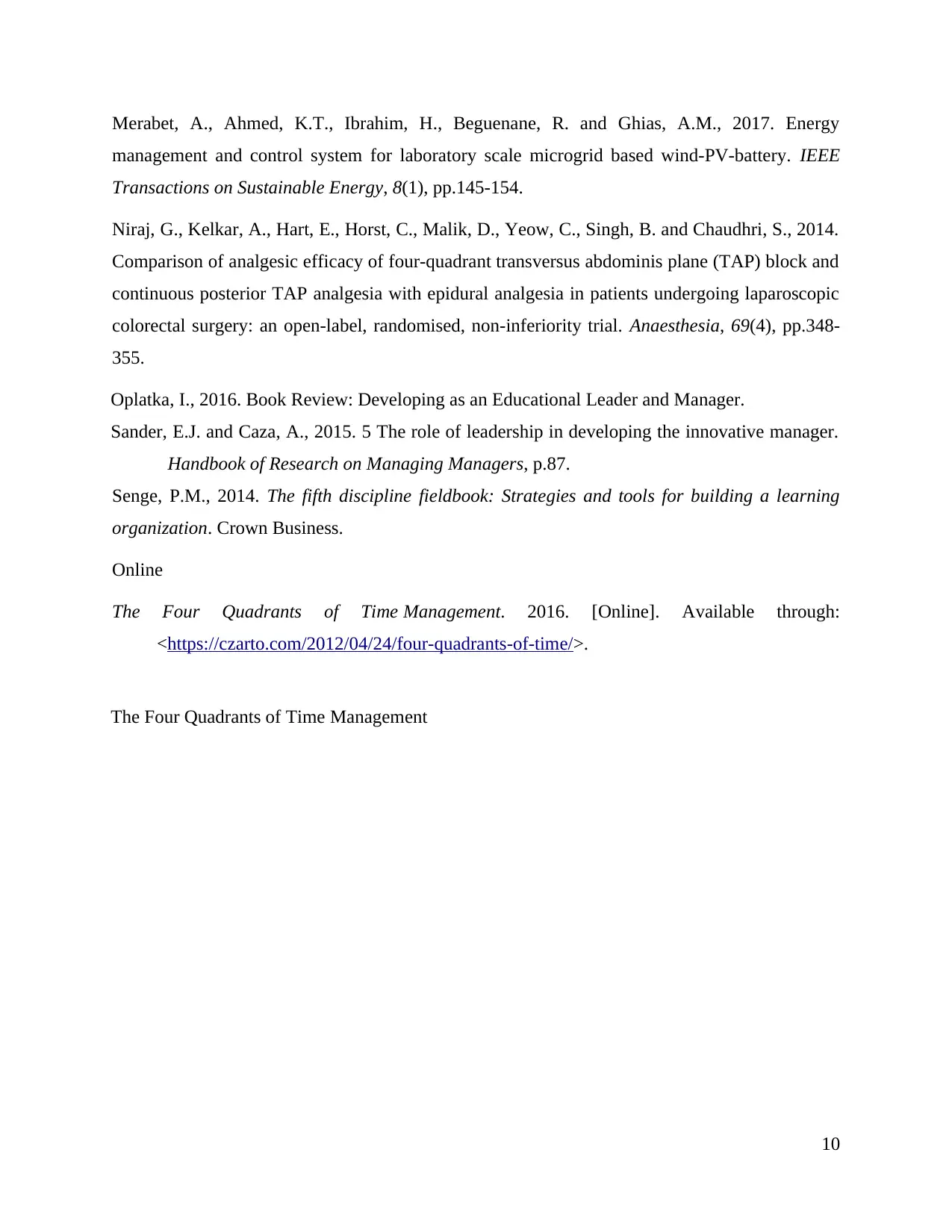
Merabet, A., Ahmed, K.T., Ibrahim, H., Beguenane, R. and Ghias, A.M., 2017. Energy
management and control system for laboratory scale microgrid based wind-PV-battery. IEEE
Transactions on Sustainable Energy, 8(1), pp.145-154.
Niraj, G., Kelkar, A., Hart, E., Horst, C., Malik, D., Yeow, C., Singh, B. and Chaudhri, S., 2014.
Comparison of analgesic efficacy of four‐quadrant transversus abdominis plane (TAP) block and
continuous posterior TAP analgesia with epidural analgesia in patients undergoing laparoscopic
colorectal surgery: an open‐label, randomised, non‐inferiority trial. Anaesthesia, 69(4), pp.348-
355.
Oplatka, I., 2016. Book Review: Developing as an Educational Leader and Manager.
Sander, E.J. and Caza, A., 2015. 5 The role of leadership in developing the innovative manager.
Handbook of Research on Managing Managers, p.87.
Senge, P.M., 2014. The fifth discipline fieldbook: Strategies and tools for building a learning
organization. Crown Business.
Online
The Four Quadrants of Time Management. 2016. [Online]. Available through:
<https://czarto.com/2012/04/24/four-quadrants-of-time/>.
The Four Quadrants of Time Management
10
management and control system for laboratory scale microgrid based wind-PV-battery. IEEE
Transactions on Sustainable Energy, 8(1), pp.145-154.
Niraj, G., Kelkar, A., Hart, E., Horst, C., Malik, D., Yeow, C., Singh, B. and Chaudhri, S., 2014.
Comparison of analgesic efficacy of four‐quadrant transversus abdominis plane (TAP) block and
continuous posterior TAP analgesia with epidural analgesia in patients undergoing laparoscopic
colorectal surgery: an open‐label, randomised, non‐inferiority trial. Anaesthesia, 69(4), pp.348-
355.
Oplatka, I., 2016. Book Review: Developing as an Educational Leader and Manager.
Sander, E.J. and Caza, A., 2015. 5 The role of leadership in developing the innovative manager.
Handbook of Research on Managing Managers, p.87.
Senge, P.M., 2014. The fifth discipline fieldbook: Strategies and tools for building a learning
organization. Crown Business.
Online
The Four Quadrants of Time Management. 2016. [Online]. Available through:
<https://czarto.com/2012/04/24/four-quadrants-of-time/>.
The Four Quadrants of Time Management
10
⊘ This is a preview!⊘
Do you want full access?
Subscribe today to unlock all pages.

Trusted by 1+ million students worldwide
1 out of 12
Related Documents
Your All-in-One AI-Powered Toolkit for Academic Success.
+13062052269
info@desklib.com
Available 24*7 on WhatsApp / Email
![[object Object]](/_next/static/media/star-bottom.7253800d.svg)
Unlock your academic potential
Copyright © 2020–2025 A2Z Services. All Rights Reserved. Developed and managed by ZUCOL.




